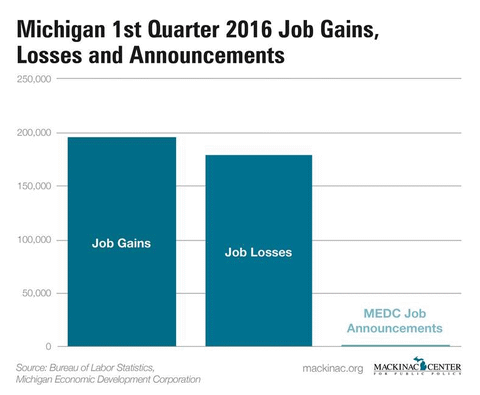Commentary
Michigan Employers Create Thousands of Jobs without the Aid of Politicians
Economic development programs just transfer money to a lucky handful
The public expects politicians at all levels to create jobs. But this is a tough thing to demonstrate. The decisions made by business owners to add jobs tend to be done without asking for permission from politicians.
The same goes for closing down a business or shedding jobs. And the jobs created by taxpayer-funded economic development programs — those that politicians take credit for — have a negligible impact on the large and permissionless job creation that drives Michigan’s economy.
For example, in the first three months of 2016, according to the Bureau of Labor Statistics, Michigan private sector businesses added 196,117 jobs and eliminated 179,106. That equates to adding about one job for every 18 in the state and losing one out of every 20. A similar amount of “job churn” happens each quarter.
Nevertheless, job-promising politicians are under pressure to show that they are, in fact, creating jobs, and they often don’t get credit for the job creation that happens without their help. That’s one reason why every state has an economic development apparatus, such as the Michigan Economic Development Corporation, that awards favors to a handful of select businesses.
The efforts of these economic development programs only amount to a blip when considering the total amount of job creation that happens statewide. Over the same three-month period in which Michigan companies added nearly 200,000 jobs, the MEDC announced that it had awarded support to companies to create just 425 jobs.
Not only is this less than 1 percent of all the jobs created, but these job pledges rarely materialize.
On top of that, these special deals cost taxpayers millions of dollars — dollars that might have had larger economic impacts if spent on something else or just left in the hands of taxpayers to spend or invest themselves.

Despite this reality, some business groups are asking state lawmakers to spend even more taxpayer dollars on targeted business subsidies. But as these data show, if lawmakers want to improve the state economy, they need to look at broad-based improvements to the state’s business climate — taxes and regulations which affect a large portion of the state’s private sector, not just a lucky few.
|

Michigan Employers Create Thousands of Jobs without the Aid of Politicians
Economic development programs just transfer money to a lucky handful
The public expects politicians at all levels to create jobs. But this is a tough thing to demonstrate. The decisions made by business owners to add jobs tend to be done without asking for permission from politicians.
The same goes for closing down a business or shedding jobs. And the jobs created by taxpayer-funded economic development programs — those that politicians take credit for — have a negligible impact on the large and permissionless job creation that drives Michigan’s economy.
For example, in the first three months of 2016, according to the Bureau of Labor Statistics, Michigan private sector businesses added 196,117 jobs and eliminated 179,106. That equates to adding about one job for every 18 in the state and losing one out of every 20. A similar amount of “job churn” happens each quarter.
Nevertheless, job-promising politicians are under pressure to show that they are, in fact, creating jobs, and they often don’t get credit for the job creation that happens without their help. That’s one reason why every state has an economic development apparatus, such as the Michigan Economic Development Corporation, that awards favors to a handful of select businesses.
The efforts of these economic development programs only amount to a blip when considering the total amount of job creation that happens statewide. Over the same three-month period in which Michigan companies added nearly 200,000 jobs, the MEDC announced that it had awarded support to companies to create just 425 jobs.
Not only is this less than 1 percent of all the jobs created, but these job pledges rarely materialize.
On top of that, these special deals cost taxpayers millions of dollars — dollars that might have had larger economic impacts if spent on something else or just left in the hands of taxpayers to spend or invest themselves.
Despite this reality, some business groups are asking state lawmakers to spend even more taxpayer dollars on targeted business subsidies. But as these data show, if lawmakers want to improve the state economy, they need to look at broad-based improvements to the state’s business climate — taxes and regulations which affect a large portion of the state’s private sector, not just a lucky few.
Michigan Capitol Confidential is the news source produced by the Mackinac Center for Public Policy. Michigan Capitol Confidential reports with a free-market news perspective.
More From CapCon